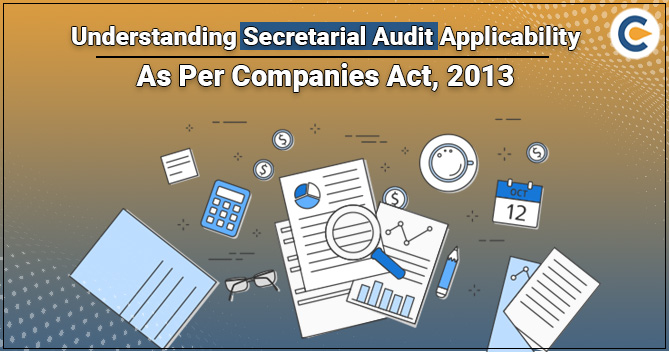The corporate sector is governed by a structure of complex laws, rules, and regulations. However, the enactment of rules and regulations is not enough unless their implementation is geared up. Secretarial Audit is one of the processes that ensure 100% compliance. To ensure the Company’s transparency, ethical, and responsible governance, Companies may get the Secretarial Audit done by a competent professional. In this article, we will pen down Secretarial Audit applicability as per companies Act, 2013.
Secretarial Audit as per Companies Act, 2013-
Under the Companies Act,2013[1], A Secretarial Audit is an audit to examine the compliances of various legislations and various other laws applicable to the companies. A Secretarial Audit is an audit where the Auditor exhibits an opinion as
To whether there persist appropriate systems and processes in the Company consistent with the size and operations of the Company. Also, it monitors and checks compliance with applicable laws, rules, regulations, and guidelines.
Applicability-
As per the mandatory provisions relating to appointment of Secretarial Audit-
- All Listed Company,
- Every Public Company with Paid-up capital of 50 crores or more, Every Public Company with a turnover of 250 crores or more,
- Any private company that is a subsidiary of a public company that falls into the above categories shall conduct a Secretarial Audit.
Note-A secretarial audit is mandatory if any of the above criteria meets.
Understanding the Secretarial Audit applicability via objectives
Go through the following underlying objectives to have a better clarity on the Secretarial Audit applicability
- To analyze the factors that necessitates a Secretarial Audit.
- To examine the regulations that governs Secretarial Audits for Companies.
- Recognizing the event of non-compliance.
- Facilitates taking corrective measures in case of non-compliance.
- Auditing of the compliance of good corporate practices followed by the Company.
- It intends to add value and improve the working of the Company.
- Helps in accomplishing the Company’s objectives.
Eligibility of Secretarial Auditor-
As per the Companies Act,2013, only a Practicing Company Secretary can carry out such Statutory Secretarial Audit.
- A Practicing Company Secretary shall prepare the Secretarial audit report.
- It shall be prepared in Form MR-3 format.
- The Secretarial Audit Report needs to be laid as an annexure by the company in its Board’s Report.
Periodicity of Secretarial Audit-
The Secretarial Audit helps the Company take disciplinary measures and build up its compliance mechanism and processes. The Secretarial Audit can be carried out-
- Periodically,
- Quarterly,
- Half-year and,
- Annually.
Important provisions regarding the Secretarial Audit under the Companies Act,2013-
The important provisions regarding Secretarial Audit are-
- Subject Matters to be disclosed in the Secretarial Audit.
- Objectives of Secretarial Audit.
- Preparation of Compliance Certificate.
- Verification of records and documents.
- Act, rules, and regulation covered under the Secretarial Audit report-
- Companies Act, 2013
- SEBI Rules and Regulations.
- Other laws.
- Period of the Secretarial Audit.
- Disqualification of the Secretarial Auditors.
Advantages of the Secretarial Audit-
The advantages of the Secretarial Audit are-
- It assures the owners that the management and affairs of the Company are being conducted following the requisite rules and regulations.
- Helps in administering professional discipline and self-regulation.
- Minimizes the work burden of the regulators due to better and timely compliances.
- It helps the investors in finding the right path by displaying the legal records.
Process of Secretarial Audit-
The process of Secretarial Audit under the Companies Act,2013 is as follows-
- Appointment of Secretarial Auditor
- Communication to earlier Incumbent
- Acceptance of Appointment by Secretarial Auditor
- Preliminary Discussions about the company with Secretarial Auditor
- Preliminary Meeting with the Auditor
- Finalization of Audit plan & briefing the staff
- Testing, Interview & Analysis
- Preparing the working papers
- Audit Summary for Discussions
- Submission of Secretarial Audit Report
Documents required for Secretarial Audit-
The documents required for Secretarial Audit are mentioned below-
- MOA, AOA, and Statutory Registers,
- Minutes and Notices of Board and General Meeting
- Previous year Secretarial Audit Report and Audited financial statements,
- In case Listed entity- Filings & Intimations with ROC, Stock Exchanges, Newspaper Advertisements.
- Performance Reports prepared on an annual basis, Deed, Bonds, and returns.
- In case of foreign investment, filings with Reserve Bank of India and other statutory departments,
- Registers maintained under Labour Laws,
- Bank account details for dividend
- Disclosure of Remuneration and Sitting fees paid by the Company to the directors.
- Particulars of CSR amount
- SAST Disclosures
- Particulars of External Commercial Borrowing Returns, if any.
Legislations that fall under Secretarial Audit applicability
The Secretarial Audit applicability can be understood by going through the following legislations. The auditors usually take these Acts under consideration while conducting Secretarial Audit of the company.
- Companies Act, 2013
- Depositories Act, 1996
- Securities Contracts Regulation Act, 1956,
- Rules and Regulations are made thereunder in the above-mentioned acts.
- FEMA, 1999 and the rules and regulations made thereunder to the extent of-
- FDI (Foreign Direct Investment),
- ODI (Overseas Direct Investment) and
- ECB (External Commercial Borrowings).
- Various Regulations and Guidelines prescribed under the SEBI Act,1992.
Secretarial Compliance Certificate under the Companies Act,2013-
Secretarial Compliance Certificate is a certificate given by a Practicing Company Secretary based on the documents received by the Company for the respective financial year.
Under the Companies Act,2013, Secretarial Compliance Certificate is a Secretarial Audit Report prepared by Secretarial Auditor. The Secretarial Auditor while preparing a Secretarial Audit report, shall mark in his report-
- A qualification,
- Reservation, or
- Adverse remarks are highlighted in Bold type or Italics.
However, suppose the Secretarial Auditor cannot form their opinion on any matter. In that case, they should specify that they cannot express an opinion on that particular matter, stating the reason.
Note- The Board of Directors of the Company in its Board’s report shall explain in full any qualification or observation, or other remarks made by PCS in the Secretarial Audit Report.
Conclusion
Secretarial Audit helps in building brand image and assures that the Company is conducting its management affairs per the governing rules and regulations. It is a dynamic governance process and an effective tool for Corporate Compliance Management that strengthens the goodwill in the minds of investors, stakeholders, and regulators. Secretarial Audit applicability is not only limited to non-compliance identification, but it also paves a roadmap for better corporate governance.
Read our Article:Changes in Secretarial Audit in the Market: MCA 2020











